Novelists are willing to explore the challenges and dilemmas of aging to create a wide array of interesting, mature protagonists and the issues they face at midlife and beyond. Our choices in contemporary fiction feature complex characters and encompass themes that are timeless and ageless, which can provide insight about the people we know or suggest what lies ahead for our future selves.
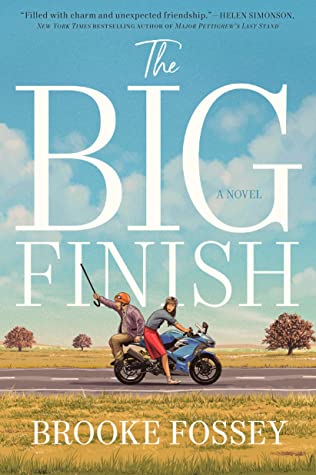 The Big Finish Posted in: Arts, Families, Fiction
The Big Finish Posted in: Arts, Families, FictionBy Brooke Fossey – Penguin Random House, 2020
In a complete reversal of the grandparent-escapes-care-facility theme, 19-year-old Josie breaks into Centennial, the assisted living facility where her grandfather, Carl, resides. No one is more surprised than his roommate, Duffy, a self-proclaimed “ass,” who believed he and Carl had no secrets. Except for a daughter and now a granddaughter living nearby? But there are more secrets, and Josie needs the help of these octogenarians. Josie arrives shoeless and reeking of alcohol, with only the clothes on her back and a black eye. She wants them to hide her for a week while she sorts things out. After years of stuffing his feelings of guilt and shame, Carl is willing to do anything to win Josie over, but Duffy knows they run the risk of getting caught and evicted to the dreadful nursing home down the street. As a recovered alcoholic himself, he’s been in Josie’s shoes—out of friends, out of options. With Duffy as reluctant leader, some of Centennial’s residents and staff conspire to detox Josie and give her recently departed mother a proper funeral. This is a big-hearted story of hijinks, unlikely friendships and the realization that we must face our truths and right our wrongs, no matter our age.
 All Adults Here: A Novel Posted in: Arts, Families, Fiction
All Adults Here: A Novel Posted in: Arts, Families, FictionBy Emma Straub – Riverhead Books, 2020
In this saga of a family laden with secrets, Astrid, a 68-year-old widow, is the matriarch, living in the idyllic, upscale town of Clapham, NY. She’s opinionated and self-centered, but as she ages, she’s softening. Astrid witnesses a neighbor (she admits she never liked her) accidentally struck down and killed by a bus. The event dislodges a long-suppressed memory, which kick-starts her desire to come clean on a secret she’s been keeping from her three grown children. In Astrid’s wildly chaotic life, the secrets revealed are what make Astrid more fully actualized as a human being, not “simply” a wife, widow and mother. The siblings believe themselves to be close, but when secrets are confessed, one son reveals he felt he never measured up to Astrid’s expectations. The other son feels ill-equipped to raise his 13-year-old daughter after an incident at school and so sends her to live with Astrid. And the adult daughter, who raises goats nearby, is hiding the fact that she is pregnant by a donor. The truths make them come together as a more authentic version of their family. This is a delightful read, a reminder that it’s OK to become an adult in later life.
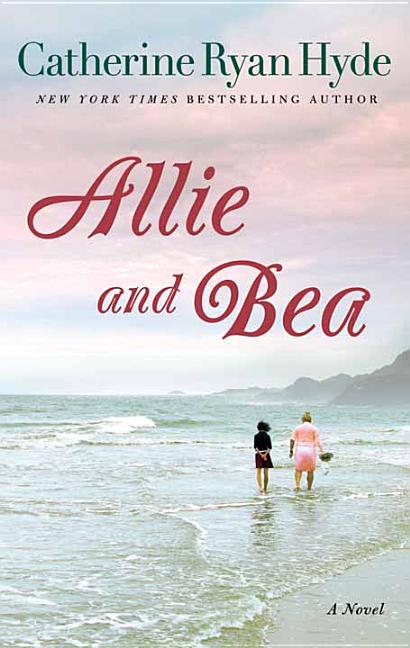 Allie and Bea: A Novel Posted in: Arts, Families, Fiction, Friendships
Allie and Bea: A Novel Posted in: Arts, Families, Fiction, FriendshipsBy Catherine Ryan Hyde – Lake Union Publishing, 2017
This is the story of a friendship. Allie is a 15-year-old whose parents have just been jailed for tax fraud. Bea is an aging-into-poverty widow who’s lost what little she had left to a telephone scam. Bea is running scams of her own now just to stay afloat financially and keep gas in the van where she lives with her cat, and Allie runs away from a group home, only to find she is woefully unprepared to live outside the life of privilege she once knew. When their paths cross, trust is nonexistent, but they each have something to teach the other. As they travel the Pacific Coast Highway in the van, they use their street smarts to navigate the journey. As the kind people they meet along the way restore their faith in humanity, Allie and Bea forge a new sense of family. This novel would be a wonderful choice for a mother-daughter book club.
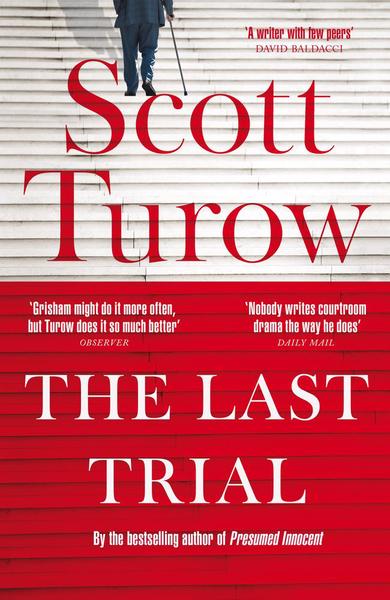 The Last Trial Posted in: Arts, Families, Fiction, Mysteries and Thrillers
The Last Trial Posted in: Arts, Families, Fiction, Mysteries and ThrillersBy Scott Turow – Grand Central Publishing, 2020
Loyal fans of Scott Turow will remember meeting attorney Sandy Stern 34 years ago in Presumed Innocent (1986), a novel that launched Turow’s career and, some claim, created the genre that we now call “legal thrillers.”
Alejandro “Sandy” Stern, now 85, has decided to retire. For his final case, his client is a long-time friend, Kiril Pafko, a 78-year-old, Nobel Prize-winning doctor who discovered the very drug, g-Livia, that put Stern’s own cancer in remission. But some patients developed a fatal reaction, and the Feds accused Pafko of a range of crimes, from insider trading to murder.
Turow, 71, a practicing attorney who takes mostly pro bono cases himself, explains the courtroom drama for laymen, but in The Last Trial what he does best is show a character who was once in total command of the courtroom accepting both the good and bad of his own aging. Stern has an occasional blip of memory loss and a fatigue that isn’t about sleep. He works alongside his accomplished daughter, Marta. Recognizing her father’s shortcomings, she silently signals him if he’s veering off the mark. Marta decides this will be her last trial as well, which likely makes it a little easier for her father, although they both want to retire with a win.
Readers are introduced to another family member. Despite a prolonged and confounding adolescence, Stern’s granddaughter, Pinky, shows real promise as a private investigator, leaving us to think court may not be adjourned after all.
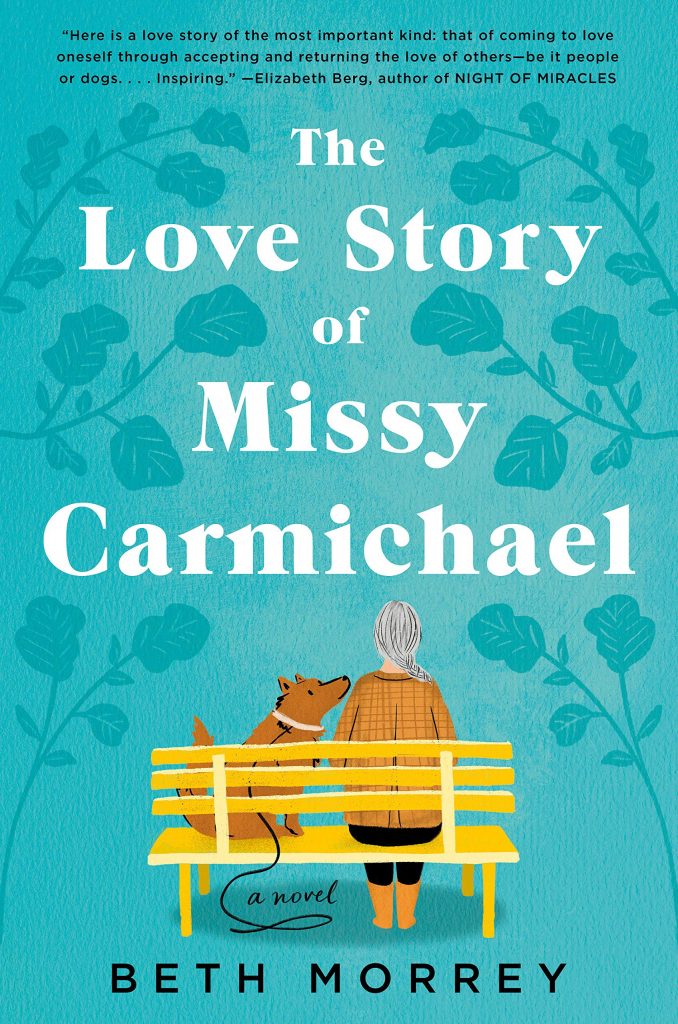 The Love Story of Missy Carmichael Posted in: Arts, Fiction, Friendships, Women’s Lives
The Love Story of Missy Carmichael Posted in: Arts, Fiction, Friendships, Women’s LivesBy Beth Morrey – G.P. Putnam’s Sons, 2020
Millicent “Missy” Carmichael is struggling with loneliness and lacks a sense of self-worth. She wasn’t always so glum; she earned an underutilized degree in Classics from Cambridge, married an academic revered in his field and raised two children. She lives alone at 79, estranged from her daughter for an argument she now regrets, and her son and beloved grandchild live a continent away. She rarely leaves her big, bland house—she’s got her books and her sherry, after all. But she forces herself to a daily walk in the park near her home and is surprised to find she’s soon recognized by some of the regulars. Her cynicism for life is overpowered by the kindness shown by a woman with a child the same age as her grandson, and Missy is embraced by the woman’s park friends. This is further enhanced when Missy reluctantly agrees to foster a mongrel named Bobby. Beyond simple companionship (Bobby is a good listener), Missy is forced to go out regularly to walk and finds the dog to be a social lubricant, if only to explain why a female dog was named Bobby in the first place. Each of the characters plays a role in making Missy see her true value as a human being and gives her a sense of purpose and belonging long absent from her life. Filled with wry laughter and deep insights, The Love Story of Missy Carmichael is a story that shows us it’s never too late to forgive yourself and, just as important, that we should never discount the power of community.
 How the Penguins Saved Veronica Posted in: Arts, Families, Fiction
How the Penguins Saved Veronica Posted in: Arts, Families, FictionBy Hazel Prior – Berkley, 2020
Veronica McCreedy is a fussy, opinionated, 85-year-old woman living in Scotland in a multimillion-dollar home with her carer, Eileen. She’s convinced herself she likes the solitude when, in fact, she’s quite lonely. One of her few escapes is television documentaries, particularly one about a colony of penguins and their researchers in Antarctica. As Veronica obsesses, Eileen finds a box of nearly forgotten diaries that remind Veronica of the secrets she has kept locked away for most of her adult life—not the least of which is that she had a son, who, in turn, had a son. Eileen helps Veronica find and meet grandson Patrick, who never knew his grandmother existed.
Still, Veronica is much more interested in the penguins than in Patrick; she informs the research crew (buttering them up with promises of inheritance) that she’s coming to stay with them. Once on the ice, she becomes keenly aware of not only the penguins but of the environmental impact of climate change on their habitat. After reading Veronica’s diaries, Patrick joins her in Antarctica. Through their shared history and time spent together with the penguins, the pair finally forge a relationship and a possible future as a family.
This is the story of a woman who chases her sense of purpose and her family ties while never misplacing her independence or her personal desire to leave the world a better place. We need more Veronicas right now.
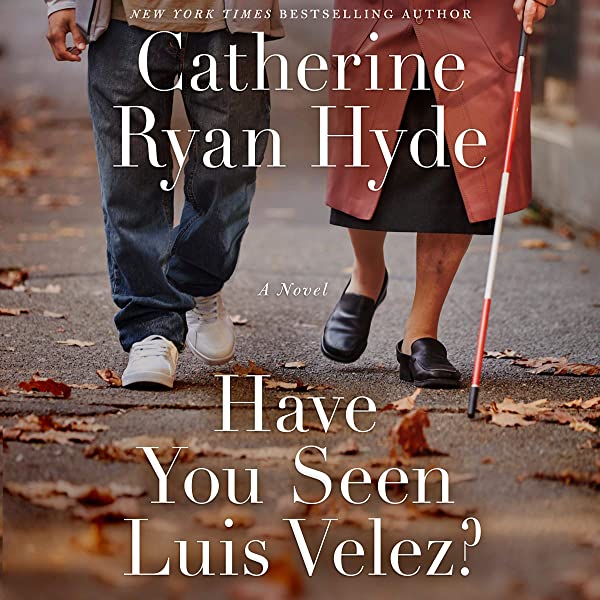 Have You Seen Luis Velez? Posted in: Arts, Fiction, Friendships
Have You Seen Luis Velez? Posted in: Arts, Fiction, FriendshipsBy Catherine Ryan Hyde – Lake Union Publishing, 2019
Raymond is an untethered, lonely 16-year-old. His parents divorced and each remarried, leaving him feeling like an outsider. He’s biracial and feels neither Black enough nor white enough. His only friend from school has moved, and the feral cat he sees on the streets is unreliable. One day a neighbor he has seen but doesn’t know emerges from her apartment and forlornly asks, “Have you seen Luis Velez?” This neighbor is Mildred Gutterman, who is 92 and blind. She lives alone and has been relying on the kindness of Luis Velez to keep her living in her apartment. Now Luis has stopped coming around and Mildred is down to her last meal.
Mildred and Raymond start a conversation that leads to a most unusual friendship. Raymond gingerly steps into the role of helpmate and decides to find Luis Velez for Mildred, a choice so out of his comfort zone that it challenges not only his shyness but his belief that people are unkind and unsympathetic. The lovely, intergenerational friendship between the pair is bolstered by how Raymond learns to see what Mildred sees despite her blindness. This is a feel-good story, simple yet deep, and just the uplift we all need right now.
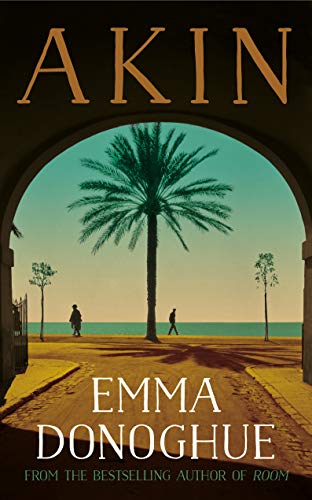 Akin Posted in: Arts, Families, Fiction
Akin Posted in: Arts, Families, FictionBy Emma Donoghue – Little, Brown and Company, 2019
Emma Donoghue follows her best seller Room (2011) with this absolute gem. Approaching his 80th birthday, widower Noah is preparing for a trip to France when a telephone call changes everything. Noah learns he’s the closest relative of Michael, his 11-year-old great-nephew whom he has never met, and who is in immediate need of a place to live to stay out of foster care. Life with a tween is as foreign to Noah as the South of France is to Michael. The two have lives so far removed from one another’s that it’s hard to imagine the gap can be bridged. We’re drawn to Noah and his struggle to do the right thing; he decides to take Michael to Nice. Noah’s internal dialogue is touching and real; his consultations with his late wife are bittersweet. Michael, displaced and now grieving multiple losses, can be exasperating. At times, Noah’s patience seems downright heroic, but it’s when he loses his composure with this troubled boy that he’s most relatable. They need to learn to trust each other to get to a place of acceptance. It’s not a straight line, but it’s a helluva trip, and we readers love traveling along with them.
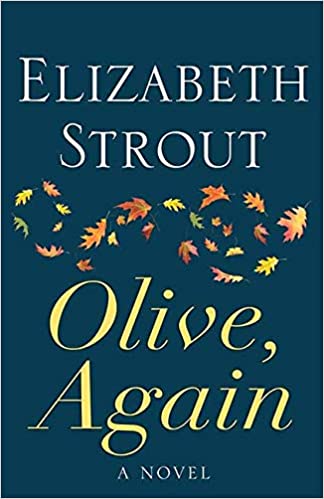 Olive, Again Posted in: Arts, Curmudgeons and Other Eccentric Characters, Fiction, Widows and Widowers
Olive, Again Posted in: Arts, Curmudgeons and Other Eccentric Characters, Fiction, Widows and WidowersBy Elizabeth Strout – Random House, 2019
Welcome back, Olive Kitteridge! It’s been over a decade since Elizabeth Strout introduced us to the most incorrigible resident of Crosby, Maine. Olive Kitteridge (2008) won the Pulitzer Prize, became a New York Times bestseller and was later adapted for an HBO miniseries. Yet Strout tells the New Yorker that she never intended to bring Olive back, saying she believed, “I was done with her, and she with me.” We are so glad that didn’t stick.
We rejoin Olive at age 73. She’s widowed now, lonely but still acerbic and off-putting to those she encounters. She finds neighbor Jack Kennison—a retired professor she and her husband felt was entitled and arrogant—incapacitated on a path, helps him up and learns they are both widowed and are somewhat estranged from their only children. Soon, Olive and Jack are married, and neither of their adult children understands it. And so it goes, each chapter a vignette that reveals Olive evolving. In some ways so dreadful, Olive becomes a woman we believe redeemable. She holds onto old ideas but starts to make room for the possibility there could be another way to see the truth. It’s inspiring to see the retired teacher become the student, and empathy takes hold of her, if transiently. Gradually, she becomes the person we hope to be in later life when confronted with the grow-or-die circumstances life throws at us. You don’t have to read the original Olive Kitteridge to enjoy Olive, Again, but I think you’ll want to. We’re so glad Strout brought Olive back and we join the fans hoping for a prequel: Olive, Before?
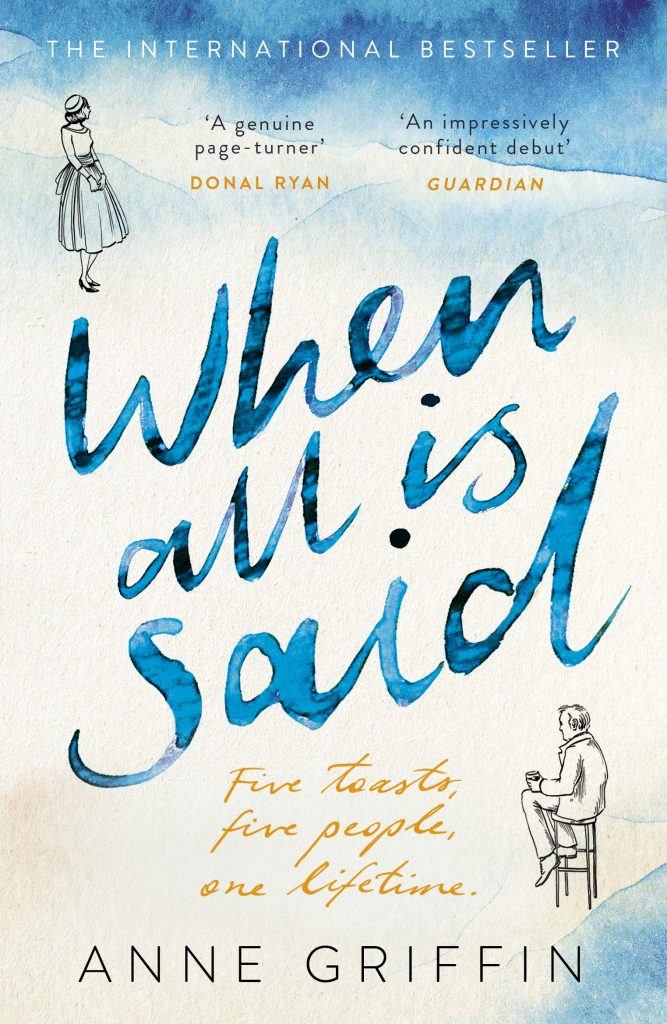 When All is Said: Five Toasts, Five people, One Lifetime Posted in: Arts, Families, Fiction, Friendships
When All is Said: Five Toasts, Five people, One Lifetime Posted in: Arts, Families, Fiction, FriendshipsBy Anne Griffin – Thomas Dunne Books, 2019
In something like a farewell address to his son, 84-year-old Maurice Hannigan sits by himself in a hotel bar, recalling his personal history, with a toast to each of the five most important people in his long and successful, if imperfect, life. In five distinct stories, he tells his son, Kevin, how his experiences and relationships made him the man he is at the later end of his life. He admits he still longs for the reassurance of his older brother, long deceased, and that the spirit of his stillborn baby daughter remains throughout his adult life. He drinks to his late sister-in-law and what he learned from his relationship with this fragile woman. He drinks to his son, examining his own shortcomings as a father who didn’t understand Kevin’s need for separateness. Finally, he toasts his late wife, whom he adored, but who was often a target for his frustrations. With each drink, more of Maurice is revealed. His grief is palpable; his candor, remarkable. He’s owning, without excusing, his failures as a husband and father. Now, he’s left with wealth and little more, and he wants to set the record straight in a way that might right the wrongs, old and new.
We come to understand that Maurice plans to join his recently departed wife in the ever-after later that night, but the story isn’t grim. Rather, his disclosures leave you thinking about the people in your own life who’ve made all the difference. If you’re a sucker for an Irish brogue, you’ll be absolutely mesmerized by the audio version of this novel. We can only assume it’s equally good to read. Either way, this debut novel is worth every second of your time.
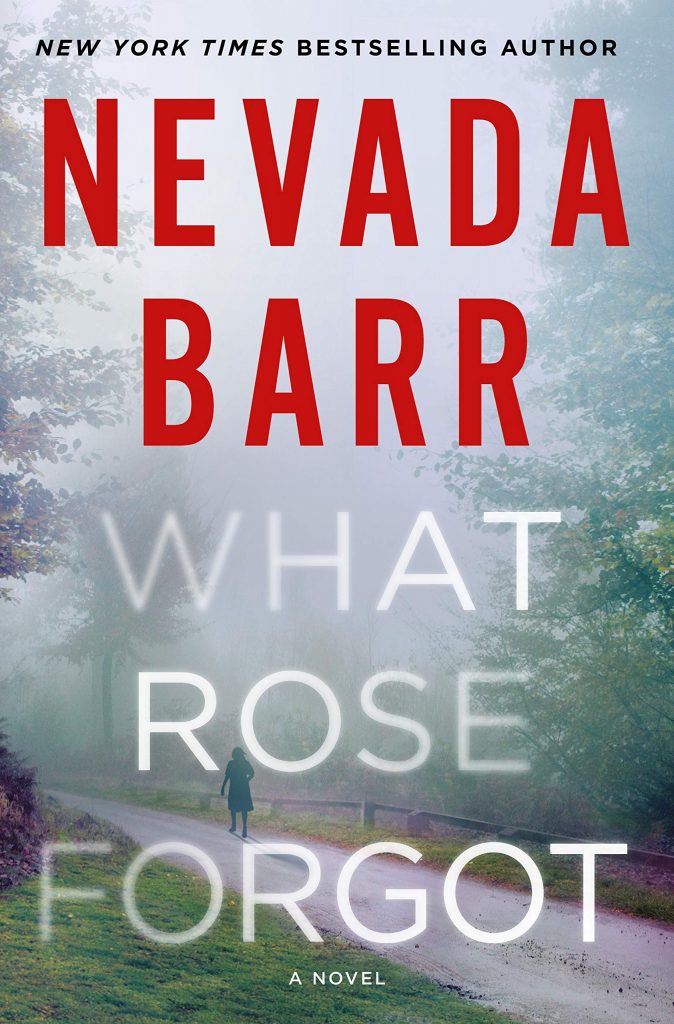 What Rose Forgot Posted in: Arts, Fiction, Mysteries and Thrillers
What Rose Forgot Posted in: Arts, Fiction, Mysteries and ThrillersBy Nevada Barr – Minotaur Books, 2019
Imagine that you’re trapped in a locked, memory care unit in a nursing home. You can’t remember anything about the last few months of your life, but you know who you are, and you’re pretty sure you’re being drugged and held against your will—especially after you overhear an administrator predict that you won’t make it through the week. That’s Rose’s situation at the start of this nail-biter of a thriller. Once she escapes the nursing home, Rose is a highly satisfactory protagonist. She’s 68 and she’s no superhero, but she’s smart and resourceful, crusty but vulnerable. As she’s hunted by the police and the unknown individuals who had her locked away, her stalwart 13-year-old granddaughter, Mel, becomes her confederate. The story is fast-moving, intense but often quite funny, and the relationship between Rose and Mel will warm your heart.
 My Ex-Life: A Novel Posted in: Arts, Families, Fiction, Friendships
My Ex-Life: A Novel Posted in: Arts, Families, Fiction, FriendshipsBy Stephen McCauley – Flatiron Books, 2018
Julie and David each face an impossible situation. They are both confronting midlife, are single and losing their homes; he, in San Francisco, she, on the coast of Massachusetts. They used to be married to one another, but when David came out to Julie, they divorced. Julie remarried and had a daughter and divorced again; she is struggling to reinvent herself as an innkeeper while raising her college-bound (or not) teen. David works as a college advisor to the privileged and entitled, not earning enough to maintain his lifestyle, and his recent ex has set his sights on the grand carriage house David rents for a pittance. Though they haven’t spoken in decades, when Julie reaches out to David to help her daughter, Mandy, he comes east with nothing to lose. Their friendship rekindles in the satisfying way a mature pairing can, though not without pitfalls. They know each other intimately, and together they discover that his yin to her yang makes them a forceful duo. She has no business savvy, he’s organized with an eye for detail. Laced with witty dialogue and well-developed characters, this is a modern story of friendship and family.
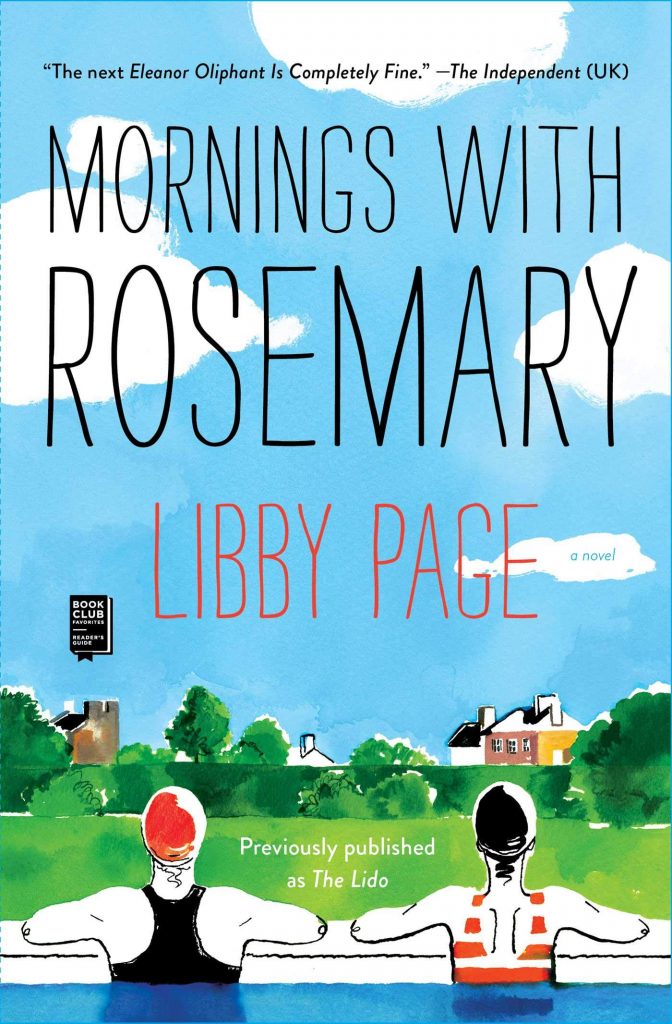 Mornings with Rosemary Posted in: Arts, Curmudgeons and Other Eccentric Characters, Fiction, Friendships, Women’s Lives
Mornings with Rosemary Posted in: Arts, Curmudgeons and Other Eccentric Characters, Fiction, Friendships, Women’s LivesBy Libby Page – Simon and Schuster (2018)
Editor’s note: This book was previously published as The Lido.
To some, the town of Brixton in south London would be just another storybook enclave. To widowed, 86-year-old Rosemary, it’s her world. And her world is changing. For the longest time, she knew everyone’s name, every shop and every shop owner. But a pub took the place of the grocery, and the library where she used to work is now closed. Her one constant is the lido. It’s the rec center and pool where she swims every day to escape and reminisce. It’s where she met her husband, married him and built their satisfying life. Now the lido is threatened as well; developers want to turn it into a health club.
Kate, a friendless, fledgling journalist in her 20s, gets a small job at a small newspaper in the small town of Brixton. Often paralyzed by depression and anxiety, she wants her lifestyle stories to make a difference, to give her life meaning. When she hears about an effort to “save the lido,” she finds Rosemary, who agrees to meet with Kate only if she’ll agree to swim. Not a swimmer, Kate finds it surprisingly therapeutic. Both lonely and lacking a sense of purpose that knows no age, Rosemary and Kate join forces to keep the lido afloat and, in doing so, rescue one another. This is a buoyant tale of friendship borne of resisting the changes that come from “progress.”
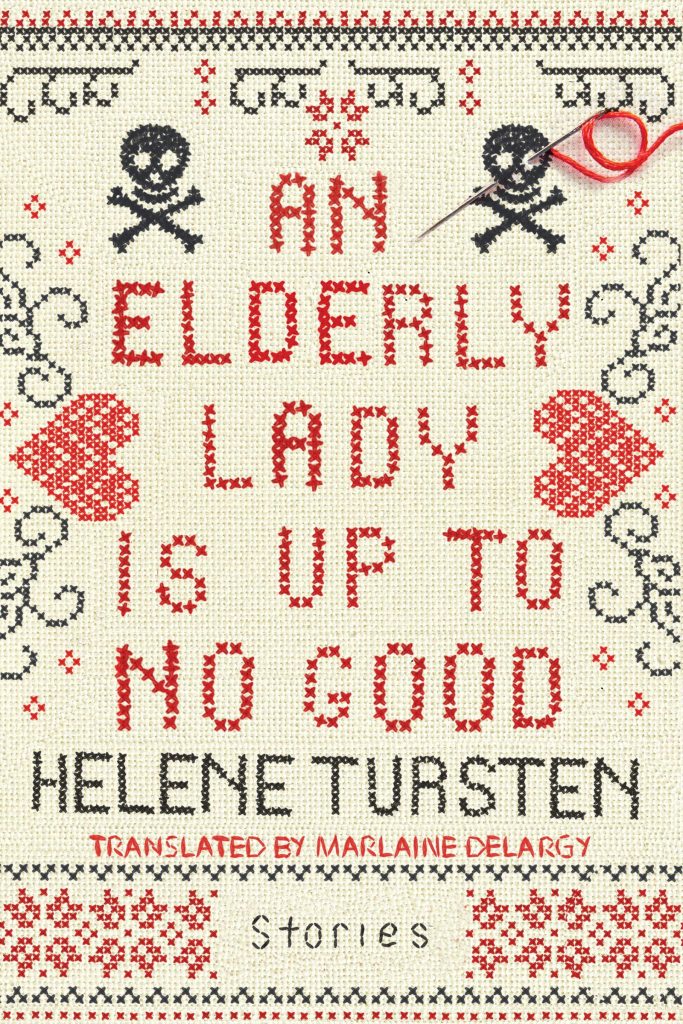 An Elderly Lady Is Up to No Good Posted in: Arts, Curmudgeons and Other Eccentric Characters, Fiction, Mysteries and Thrillers
An Elderly Lady Is Up to No Good Posted in: Arts, Curmudgeons and Other Eccentric Characters, Fiction, Mysteries and ThrillersBy Helene Tursten – Soho Crime, 2018
What a romp! Don’t let this sweet face fool you, or you’ll be taken in by Maud. Imagine an innocent-looking older woman who is also a serial killer. Naughty doesn’t begin to describe her and the antics she’s involved in. At 88, Maud has no friends or family and seems to like it that way. She has no tolerance for fools and no qualms about expressing her opinion nor acting on impulse. Wily, crafty Maud isn’t above feigning feeblemindedness to get what she wants. Will the authorities never learn? Told in short vignettes laced with subtle, black humor, the chapters are best savored one at a time. This tiny gem of a book—184 pages—is for anyone who has been underestimated and prevailed.
 The Lager Queen of Minnesota: A Novel Posted in: Families, Fiction, Women’s Lives
The Lager Queen of Minnesota: A Novel Posted in: Families, Fiction, Women’s LivesBy J. Ryan Stradal – Pamela Dorman Books (2019)
Thirsty for a feel-good, intergenerational, family saga? This is a story of love, hardship and pure Minnesotan can-do. Estranged for 50 years, sisters Edith and Helen are both aging into poverty—one, financial, and one, emotional. Edith has spent her life struggling to make ends meet, never quite able to explore her own dreams. Helen has scrapped and schemed to make her lifelong dream of brewing beer a success, but the end of that road has turned out differently than she expected. Then there’s Diana, Edith’s granddaughter, who lurches her way through a childhood clouded by grief and delinquency into a career she never expected. When Diana is unable to nurture her fledgling brewery, Edith and her friends (all over 60) step in. None has ever brewed beer; some of them don’t even like it. None of them blink an eye. And here’s the best part: no one tells these women that they are too old to do it. Along the way, the women all learn a bit more about themselves and what they want to do with their lives (including making beers they would actually want to drink). Edith, Helen and Diana’s stories intertwine with interesting facts about beer and with what it’s like to grow up and grow old. This is a refreshing story that all can enjoy, even if your preferred brew is tea.
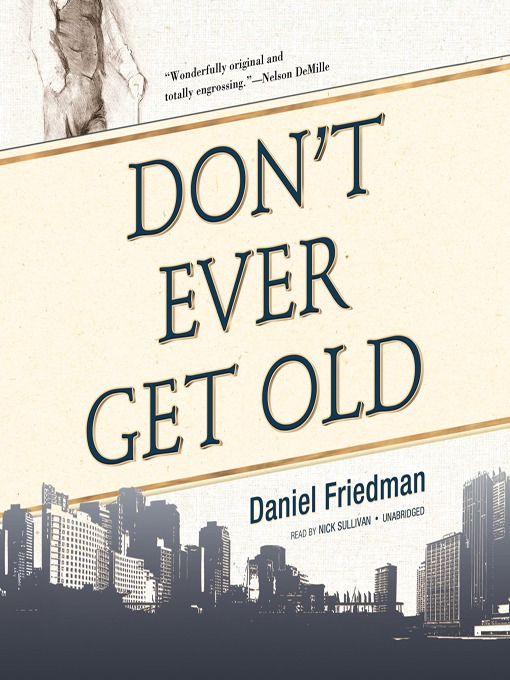 Don’t Ever Get Old: A Mystery Posted in: Curmudgeons and Other Eccentric Characters, Fiction, Mortality, Mysteries and Thrillers
Don’t Ever Get Old: A Mystery Posted in: Curmudgeons and Other Eccentric Characters, Fiction, Mortality, Mysteries and ThrillersBy Daniel Friedman–Minotaur Books, 2013
This really hits the high notes for being a clever crime novel that’s also an honest portrayal of an aging, opinionated gumshoe. Long retired at 87, Buck Schatz had a decorated career with the Memphis police department. He’s known as a no-nonsense detective who still holds the record for killing the most suspects. (Buck has no regrets, they deserved it.) A Jewish veteran of World War II, Buck endured incarceration in a Nazi prison camp. Now he discovers that his torturer has escaped Germany and has been living in the United States. Buck enlists his grandson, Tequila, to teach him how to use technology to foil his nemesis. Soon Buck and Tequila are murder suspects themselves. Throughout their adventure, Buck grudgingly accepts his failing memory and deteriorating body (readers will appreciate his sense of humor about his mortality) while relying on his still-sharp intuition. Buck is a colorful character who doesn’t shy away from candid observations, often wickedly funny. Read this novel somewhere you can freely laugh out loud. And if you love it like we did, you’ll be happy to know there’s a sequel: Don’t Ever Look Back (2014).
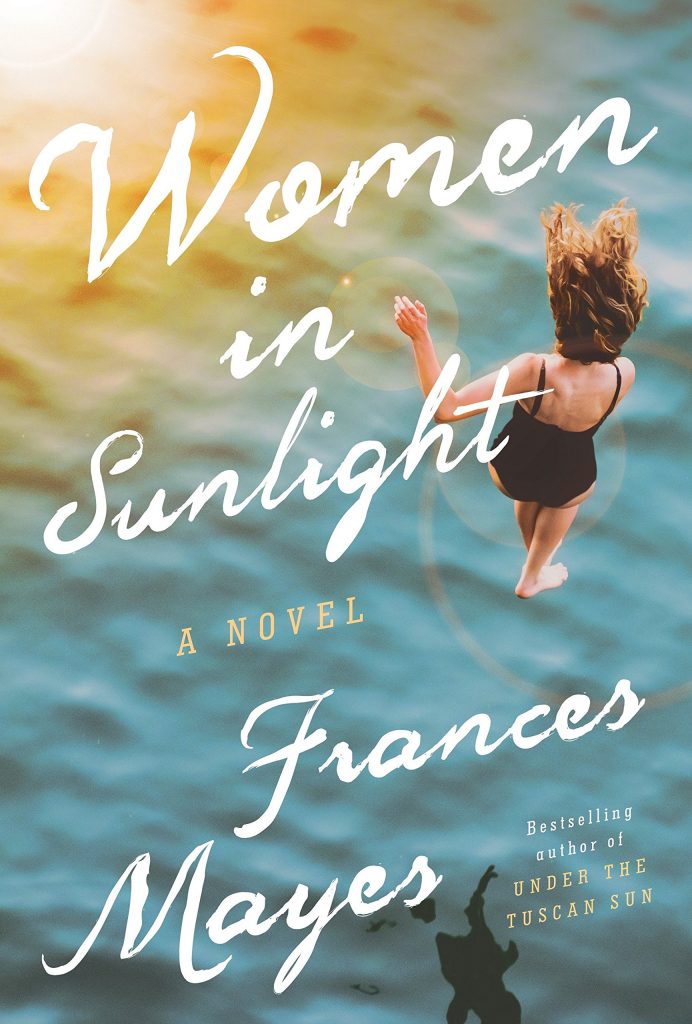 Women in Sunlight Posted in: Fiction, Friendships, Women’s Lives
Women in Sunlight Posted in: Fiction, Friendships, Women’s LivesBy Frances Mayes—Crown, 2018
If you were one of the millions of readers who dreamed of moving to a fixer-upper in Italy after reading Frances Mayes’ Under the Tuscan Sun (1996), get ready to pack your bags because she’s done it again. In her new novel, three single women are considering the next chapter of their lives during an exploratory visit to an upscale retirement community. Camille, 69, Susan, 64, and Julia, 59, are each moving on after personal tragedies. Despite knowing each other just a very short time, they decide to rent an Italian villa together. They are conflicted about the commitment to full retirement; the trip will serve to sow some oats and get the wanderlust from their systems. This story revolves around the power of place, lush with description, and of mature and supportive friendships. Ahh, the menus, the wine, the shopping, the freedom. How lovely it is for our trio: they seem to eat without gaining weight and furnish a villa, buy art and tour the countryside with indifference to the cost. (It is fiction, after all, and a glorious escape.)
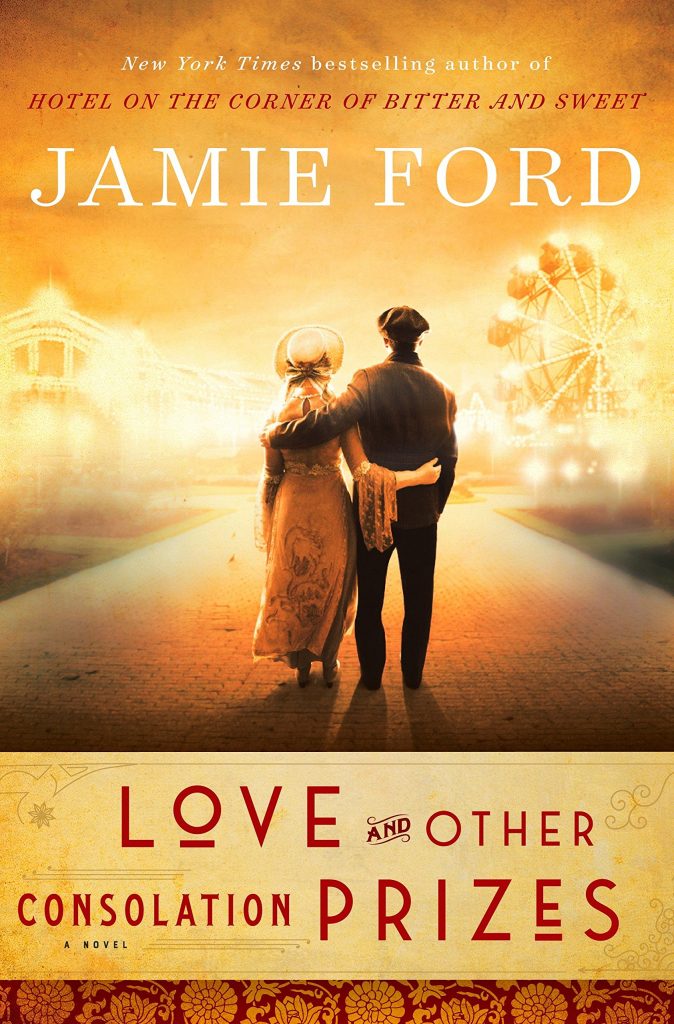 Love and Other Consolation Prizes: A Novel Posted in: Families, Fiction
Love and Other Consolation Prizes: A Novel Posted in: Families, FictionBy Jamie Ford — Ballantine Books, 2017
Ernest Young, a mixed-race, bastard child in the early 1900s, travels alone on a freighter from China to the United States, sent by his mother, who is desperate for him to escape certain poverty and famine. This well-researched work of historical fiction tells the story of Ernest’s journey: placed in an orphanage, auctioned off at the world’s fair; and of his life in a brothel and all the years after, until he’s an older man, when he is confronted by his daughter, who discovers pieces of the truth Ernest has never divulged. As he relives his memories, he wonders if looking at the past could help his wife, who has dementia. And would that be a good thing?
This novel is a story of a husband’s devotion to his beloved wife and the memories they’ve kept between them. It may make you question how you defend the decisions you have made in difficult times, or how you might choose to share the less-flattering pieces of your life with your children. In the end, do you think an uncomfortable truth should be a burden taken to the grave?
 The Housekeeper and the Professor Posted in: Families, Fiction, Friendships
The Housekeeper and the Professor Posted in: Families, Fiction, FriendshipsBy Yoko Ogawa — Picador, 2009
Translated from Japanese, so elegant and spare that it’s quite remarkable, this novella should not be missed. Neither main character is ever named. The housekeeper narrates the story of the professor, who retains his brilliant mind after a car accident but is left stuck in 1975 and can hold onto nothing new beyond the last 80 minutes. The housekeeper, a high school dropout with a 10-year-old son, must reintroduce herself at least once a day. Despite the difference in their academic backgrounds, they use mathematics to put systems in place for the professor to live with some autonomy. He bonds with her son, whom he calls Root for his flat head that resembles the square-root symbol. The two connect over a mutual love of baseball, which is, after all, a game of numbers. This story extolls the value and simplicity of living in the present and shows how we can unite with one another over common ground if we just slow down long enough to recognize it.
 The Dollhouse: A Novel Posted in: Mysteries and Thrillers, Women’s Lives
The Dollhouse: A Novel Posted in: Mysteries and Thrillers, Women’s LivesBy Fiona Davis — Dutton, 2017
Aspiring career women of the 1950s often left home to attend secretarial school or to seek jobs in New York City. The times called for young, unmarried women to live in supervised boarding houses to preserve their reputations, and the glamorous Barbizon Hotel was one such residence. The women experienced unfathomable sexism, yet they played as hard as they worked, with forbidden escorts and visits to jazz clubs in “bad” parts of town. This novel centers around the Barbizon, which was renovated to upscale condominiums in 1981. A few original tenants, now in their 80s, like Darby McLaughlin, were grandmothered in and still live on the fourth floor. New renter Rose Lewin, a journalist, is intrigued by an unsolved mystery from the ’50s and is determined to solve it with Darby’s help. Readers will enjoy this look at vintage Manhattan as the duo’s reconnaissance takes us back to the hotel’s heyday, illuminating the lives of residents and staff at that time in the city’s history.


